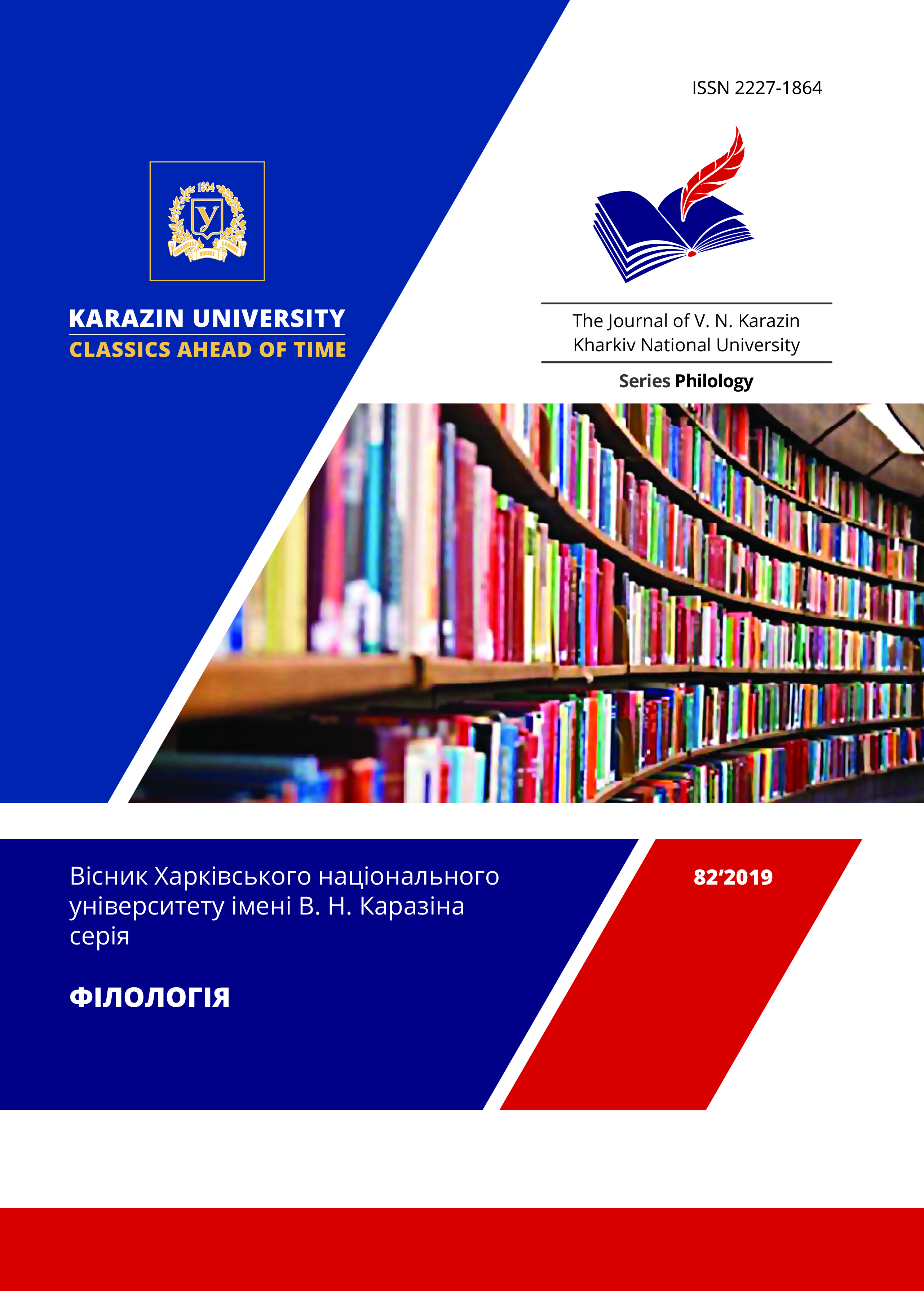Поетикальні особливості книги О. В. Амфітеатрова «Горестные заметы»: жанрові кореляції та інтертекстуальність
Анотація
У статті розкриваються характерні особливості поетики книги О. В. Амфітеатрова «Горестные заметы»: кореляції нарисів із жанрами різних пластів словесності, системне використання посилань на образи й мотиви з інших текстів, широке цитування, оперування відомими історичними фактами. На матеріалі текстів публіцистичних нарисів, які склали книгу, показано, як письменник збагачує їх форму за рахунок включення жанрових ознак епістолярної літератури (лист), ораторської прози (агітаційна промова), журналістики (некролог), мемуаристики (літературний портрет), фольклору (анекдот).
Прикладом використання у текстах «Горестных замет» епістолярного жанру слугують нариси «Відповідь читачу-емігранту» і «Г. Веллс у Петрограді». В них автор втілює власні спостереження і роздуми про більшовицький устрій у формі листа, наводить фрагменти листів інших людей, які особисто пережили катаклізми революційних років. Нарис «Горе, яке сміється» являє собою промову, написану для виступу на зібранні емігрантів на допомогу голодуючим у Росії. О. В. Амфітеатров вільно структурує текст доповіді, зберігаючи у нарисі лише один нормативний структурний елемент агітаційної промови – заклик до необхідної дії.
Нариси «М. С. Гумільов», «Пам’яті Абрама Євгеновича Кауфмана» поєднують у собі риси некрологу (присвячені людям, які недавно померли; містять біографічні відомості про них та оцінку їх діяльності) та літературного портрету (на основі особистих спогадів автора пропонуються характеристики «живої натури» людей мистецтва). У окремі тексти «Горестных замет» письменник вводить історико-біографічні та побутові (фольклорні) анекдоти. Вони слугують ілюстраціями прорахунків більшовизму та ставлення народу до радянської влади.
Багата інтертекстуальність книги виконує функцію образного розкриття антибільшовицького пафосу, виводить зображувані ситуації й характери на більш глобальний історико-культурний рівень. Питанню про історичні (події Смутного часу, Великої французької революції, образи диктаторів, завойовників, прихильників політичного насильства) і біблійних (мотиви Об’явлення Івана Богослова, притча про «лепту вдовиці» з Євангелія від Марка) алюзії у статті приділяється окрема увага.
Завантаження
Посилання
Amfiteatrov, A.V. (2003). Horestnyie zamety [Woeful Notes]. Sobraniie sochinenii – Collected Works. A.V. Amfiteatrov. (Vols. 1-10, Vol. 10). Moscow: NPK «Intelvak» [in Russian].
Barakhov, V.S. (1985). Literaturnyi portret (Istoki, poetika, zhanr) [Literary Portrait (Sources, Poetics, Genre)]. Leningrad: Nauka [in Russian].
Botasheva, Ye.M. (2012). Teatr i sotsium v publitsisteke A.V. Amfiteatrova [Theatre and Society in A. V. Amfiteatrov’s Publicistics]. Filologos – Philologos, 13, 18-26 [in Russian].
Husieva, O.O (2012). Zhanr narysu v rosiiskii literaturi XVIII – pochatku ХХІ stolittia [Genre of Essay in Russian Literature in XVIII – the Beginning of XX Century]. Extended abstract of Doctor’s thesis. Simferopol [in Ukrainian].
Kacitsin, A.V. (2010). Poetika ocherkovoi prozy Borisa Pilniaka [Boris Pilnjak’s Essay Prose Poetics]. Extended abstract of candidate’s thesis. Moscow [in Russian].
Krasovskii, V.Ye. (1989). Aleksander Amfiteatrov zhurnalist i pisatel [Alexander Amfiteatrov Journalist and Writer]. Zakat staroho veka: Romany, felietony, literaturnyie zametki – Sunset of Old Century: Novels, Feuilletons, Literary Notes. V.Ye. Krasovskii. Kishinev: Literatura artistike [in Russian].
Kurhanov, Ye. (1997). Anekdot kak zhanr [Anecdote as a Genre]. Saint Petersburg [in Russian].
Nikoliukin, A.N. (Eds.). (2001). Literaturnaia entsiklopediia terminov i poniatii [Literature Encyclopedia of Terms and Notions]. Moscow: NPK «Intelvak» [in Russian].
Prokopopov, T. (1997). Kakaia samopozhertvennaia zhizn! Vekhi sudby i tvorchestva A. V. Amfiteatrova [What a Self-Sacrificing Life! Milestones of A. V. Amfiteatrov’s Fate and Writings]. Baby i damy: Romany i rasskazy – Women and Ladies: Novels and Short Stories. A.V. Amfiteatrov. Moscow: Terra [in Russian].
Pushkin, A.S. (1995). Yevhenii Onehin [Eugene Onegin]. Polnoie sobraniie sochinenii – Complete Works. A. S. Pushkin. (Vols. 1-19, Vol. 6). Moscow: Voskresenie [in Russian].
Reitblat, A.I. (2014). Feliietonist v roli memuarista [Feuilletonist in the Part of Memoirist]. Pisat poperek: stati po biohrafike, sotsiolohii I istorii literatury – To Write Across: Articles on Biographics, Sociology and History of Literature. A.I. Reitblat. Moscow: Novoie literaturnoie obozreniie [in Russian].
Sotnikova, Yu.A. (2006). A. V. Amfiteatrov i yeho roman «Vosmidesiatniki» v sotsiokulturnom kontekste 1880-h – nachala 1900-h hodov [A. V. Amfiteatrov and his Novel «Vosmidesiatniki» in Social and Cultural Context of the 1880s – the Beginning of the 1900s]. Extended abstract of candidate’s thesis. Tambov [in Russian].
Uells, H. (1964). Rossiia vo mhle [Russia in the Shadows]. Sobraniie sochinenii – Collected Works. H. Wells. (Vols. 1-15, Vol. 15). Moscow: «Pravda» [in Russian].
Hazaherov, H.H. (2009). Ritoricheskii slovar [Rhetorical Dictionary]. Moscow: Flinta; Nauka [in Russian].
Shmelev, I.S. (1999). Russkii pisatel. Polveka pisatelskoho truda A. V. Amfiteatrova [Russian Writer. Half a Century of A. V. Amfiteatrov’s Writing]. Sobraniie sochinenii – Collected Works. I.S. Shmelyov. (Vols. 1-5, Vol. 7 (additional)). Moscow: Russkaia kniha [in Russian].




